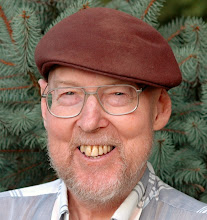On this last day of my vacation I continue to ponder trust. The people of Plow Creek are used to me pairing "trust and openness" as if they were a couple of nesting mallards.
Coca Cola and KFC are two companies who are famous for guarding their secret recipes for soft drinks and fried chicken respectively.
They clearly believe that a well-kept secret is the path to power. Not trust and openness.
I wasn't always "the world's most open man", a comment by my wife. I grew up in a tough Scandinavian clan who knew how to suffer in silence. When my body began to fall apart at age 17 with the onset of rheumatoid arthritis I kicked suffering in silence into high gear.
When hit with humiliation after humiliation I toughed it out.
By the time I was 21, after my seventh surgery in four years, I was so depressed that I thought I might end up on the psych ward. Being a strong, silent Scandinavian didn't seem to be working very well.
I sought out a Christian professor on campus and poured out about 15% of my woes. That proved to be helpful. Especially when I managed to put into words that I was quite sure God didn't want me to get married. After all, he didn't seem to mind me becoming disabled; he probably wanted me to see me suffer more by dashing my dream of being married.
When you suffer in silence long enough it's amazing the thoughts your brain comes up with.
The professor didn't try to correct my thinking. He simply asked if I had asked God about marriage. I hadn't. Although I continued to cling to a belief in God like a man clinging to the debris of a sinking ship, I wasn't too sure that at any moment he might step on the fingers.
Since he hadn't answered my desperate pleas to be healed...
But the professor seemed to think it was okay to ask God about getting married. To me his suggestion was as hopeful as dew forming during a night in the desert. I asked.
Sure enough one morning a few months later I woke and while lying in bed praying I sensed God telling me that it was okay to get married.
That answer gave me the confidence I needed to do my part in the summer of '73--Rich and Sarah fall in love. Maybe there was a better way than suffering in silence.
That wild idea was confirmed for me in 1981, three and a half years into my sojourn at Plow Creek. I found myself telling my sharing group my story of becoming disabled. I'd shared it all with Sarah during our courtship but this was the first time I ventured to trust a group of people, a bunch of God's people, no less.
The first time I shared I shared maybe 20% of the humiliations and I thought I was all done. When I was done someone in the group said they'd be glad to hear me share more. Hmmm, I thought, maybe there is more.
A few weeks later I went deeper into the story. They listened so kindly--Margaret even cried with me. For the first time I began to discover some meaning to the humiliations. For instance, I grew up in a Pentecostal church and I answered many altar calls, asking for healing. At first, I fully expected to be healed. I would head to the front of the church, eager for the laying on of hands, eager to be healed. But after answering repeated altar calls and not being healed, I found myself limping back to my pew in utter desolation.
"You were the scape goat," said one of the men in my sharing group. When I didn't know what he was talking about he pointed me to the Old Testament where I discovered my story. The people of Israel had a ritual of laying their hands on a goat to place their sins on the goat, and then the goat was drivien into the wilderness.
My dear Pentecostal people laid hands on me in faith at first. But eventually as I was not healed they kept laying hands on me in, what I suspect, was anxiety.
No one in my church talked to me about me not being healed. I answered altar calls, they laid hands on me and prayed fervently, and then, like the scapegoat of old, I wandered off into the wilderness.
Eventually I stopped answering altar calls. God can heal me, I declared to myself, but he obviously isn't doing it through altar calls. Then a few years later I drifted away from the Pentecostal church.
I could have kept guarding myself, not exposing my humiliations, keeping my shame a secret and climbed to the top of some organization on talent and endurance, making sure that I would never be weak and humiliated again.
But suffering in silence would have kept me wandering the desert. In a deep sense, in that Plow Creek sharing group, I came home. After losing my Pentecostal people I found a new people.
A few weeks later Plow Creek asked me to become a pastoral elder, in part, I suspect because on some level they knew needed an elder who was comfortable with his own weakness. They could trust a man with power who makes no secret of his brokenness.
Trust and openness is a path that leads home.
Subscribe to:
Post Comments (Atom)


No comments:
Post a Comment